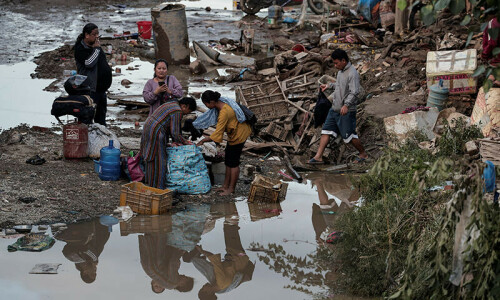The Dec 7 crash of an Islamabad-bound Pakistan International Airlines (PIA) flight from Chitral, PK-661, in Havelian which left 47 people dead has raised questions about future strategies and policies to identify the dead in incidents such as plane crashes and fires such as the 2012 Baldia factory fire in Karachi that killed more than 250 people.
People also need to be made aware that their DNA samples should be available in case of such incidents, as DNA is the best way to identify a body.
A health expert, who asked not to be named, said the identification of bodies is made part of the airplane’s insurance in most countries, so after any such incident the services of the agency hired by the insurance company become available. It also becomes easier to match DNA samples if an agency with expertise is involved.
However, in this case, he said the PIA and the Pakistan Institute of Medical Sciences (Pims) tried to collect and match DNA samples rather than turning to an insurance company or a company hired for the purpose.
“The bodies of passengers are shattered after a plane crash but some parts, such as dental forensics, badges on uniforms and sometimes jewellery remains intact, and sometimes fingerprints remain intact. Dead bodies can be identified with those things; for example, Gen Ziaul Haq’s body was identified from the dental bone,” he said.
“Since it is a social requirement to hand over the dead body to the family, they try to give the trunk and any other part of the body that can be dislocated from it and identified through a DNA test. A separate coffin is handed over to each family so they can hold a burial.”
“The passenger’s DNA is the most suitable way to identify a body, so the passenger’s toothbrush or samples given to a lab for blood testing are asked for. Then, a blood relative is called for a sample,” he explained. The health expert suggested that a reference sample should be kept even after the body has been identified, in case it is required again.
“In the United States, in such cases or criminal cases – rape, murder etc – a sample is saved for a hundred years because it can be required in appeals in various courts. But in Pakistan, laboratory reports state that samples will be discarded after 30 days, and most of the time, reports are received after six months so the sample has been discarded before the reports are handed over.”
A pathologist said that a DNA report, usually, can be finalised in two days. But in incidents like plane crashes, it becomes harder because one sample has to be matched with all the bodies and dismembered parts.
It can also become difficult to extract DNA from a burnt body. “Although live cells can be extracted from the bone, DNA is also affected by burning and it often becomes corrupted,” the pathologist said. He added that experts are particularly careful in sensitive cases and take longer to make sure there are no errors.
In response to a question, the pathologist said there are two ways to store DNA: it can either be dried and stored, or frozen at -20 to -40 degrees Celsius or below, to ensure the sample isn’t corrupted. A US Food and Drug Administration approved kit is used to store and identify DNA, he said.

Prof Dr Riazuddin, a molecular biologist, said forensic DNA sampling can be a complicated process, and one sample can take nearly 10 days to process.
He said a polymerase chain reaction (PCR) and genetic analysis machine are required to make a DNA profile.
“Usually, it takes a day and a half to isolate the DNA from the cells and after that, it is placed in a PCR machine and the machine makes a million copies and they are compared,” he said.
Dr Riazuddin also said that while it is easy to extract DNA from blood, it can be corrupted when extracted from burned bone.
He said there are 13 loci inherited from both parents in DNA, and the length of a locus is measured to identify the set of parents. DNA is extracted by drilling into the bones.
“These kinds of incidents can happen to anyone, so people should keep records of their dental treatment and their lab tests safe. Dental health, especially, should be documented. Some people have metallic valves in the heart and stents in arteries, hearing implants and other implants, so that kind of record can also be helpful in identifying dead bodies,” he added.
Pims administrator Dr Altaf Hussain said because of the sensitivity of the matter, they made sure to avoid the possibility of error. He also advocated legislation that would make it easier to identify dead bodies.
“Labs should be well-equipped, and they should have the best human resource along with the capacity to prepare DNA reports. All over the world, forensic labs prepare DNA reports even if it is included in the insurance, so it does not matter if the identification of passengers was part of the insurance or not,” he said.
“In these kinds of incidents, people should not listen to rumours but have confidence in institutions like Pims, because we cannot afford to be negligent in such matters,” Dr Hussain added.
Published in Dawn, January 1st, 2017















































